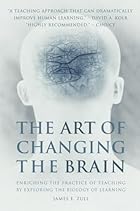 The Art of Changing the Brain by James E. Zull (2002, Stylus Publishing) is subtitled “Enriching the Practice of Teaching by Exploring the Biology of the Brain” and I picked it up because of my new role as teacher to my homeschool aged son. As his primary teacher, I want insight and assistance in understanding how to teach. I was intrigued by Zull’s approach to teaching by examining how the brain works. Although The Art of Changing the Brain does get technical in places, in general, it is a fascinating look at how learning is a biological process.
The Art of Changing the Brain by James E. Zull (2002, Stylus Publishing) is subtitled “Enriching the Practice of Teaching by Exploring the Biology of the Brain” and I picked it up because of my new role as teacher to my homeschool aged son. As his primary teacher, I want insight and assistance in understanding how to teach. I was intrigued by Zull’s approach to teaching by examining how the brain works. Although The Art of Changing the Brain does get technical in places, in general, it is a fascinating look at how learning is a biological process.
By learning how the brain works, I feel I have a great understanding at why certain teaching methods work and why others may not. The main take-aways I have from Zull’s book at the following. Some of these are rather obvious, but learning about them in the context of our brain was memorable.
- People can only create new learning by building on past learning. Physically, they must build on existing neuronal networks.
- People learn when they are emotionally engaged in the subject. Ideally, they will be so emotionally involved that they will dream about the subject.
- Being physically engaged in a subject engages the emotions. Reading, seeing, and listening are all ways to become physically engaged, so it doesn’t just mean moving.
- Learning is more effective when the learner ponders and makes the connections his- or herself. Listening to a lecture is not as effective as asking the questions and searching for your own answers. Faster is not better!
- Acting on new knowledge, either by writing about it (i.e., this blog post) or discussing it helps to solidify the newly created synapses. The learner will have learned more effectively by acting on it; it’s a way of reflecting.
- When a learner feels he or she owned the learning process, the learning is much more effective. (That is, creating an environment in which the learner can say “I did this myself” is much more effective than being told or helped along the way.)
Professor Zull is a college-level biology teacher. As such, the book is technical in places and it does seem geared toward teachers of older learners. However, as the teacher of an elementary aged child, I still found it helpful and enlightening. In fact, I loved reading it! I hope to be able to internalize the realities he discussed as I seek to help my young son learn.

Oh, how interesting! Have you heard of the book On the Origin of Tepees? I think, based on some of the stuff you mention above here, you might enjoy the ideas he presents in that one. Though there are some parts where he sounds very much like, “Western civilization is the best and most advanced ever!” overall, it was an interesting read.
“Learning is more effective when the learner ponders and makes the connections his- or herself”
I completely agree. When I’m studying a subject I don’t think I have learned anything until I start making connections (even between subjects). When I see them, that’s the moment when I’m happy with my work.
How interesting! I’ve recently been very interested in memory techniques and training your brain to retain more information. This book sounds great, covering the scientific side of it, and I’m sure would back up why certain memory and learning techniques work so well! I’ll definitely will look out for it next time I’m in a bookshop 🙂